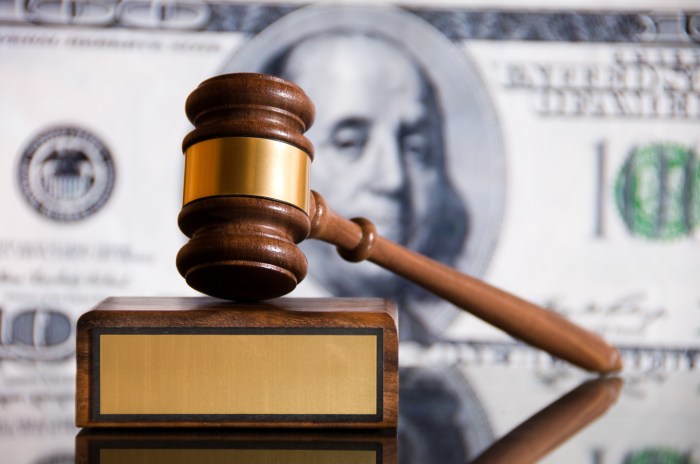Navigating the complexities of personal injury lawsuit settlements can be daunting. This guide provides a comprehensive overview of the key elements, factors, and processes involved in reaching a fair and satisfactory resolution.
Personal injury lawsuit settlements can be a complex process, but understanding the accident lawsuit filing process can help you navigate it effectively. By following the steps outlined in Accident lawsuit filing process , you can ensure that your rights are protected and that you receive fair compensation for your injuries.
Once you have filed your lawsuit, you can begin the process of negotiating a settlement that meets your needs.
From understanding liability and damages to negotiating effectively and gathering essential evidence, this guide empowers you with the knowledge and strategies to maximize your settlement value.
Elements of a Personal Injury Lawsuit Settlement

A personal injury lawsuit settlement is a legal agreement that resolves a claim for damages resulting from an injury caused by the negligence or wrongful conduct of another party. The key elements of a settlement include:
- Liability: Establishing who is legally responsible for the injury.
- Damages: The financial compensation awarded to the victim for their losses, including medical expenses, lost wages, pain and suffering, and emotional distress.
- Settlement Amount: The agreed-upon sum of money that the defendant pays to the plaintiff to resolve the claim.
Common types of damages awarded in personal injury settlements include:
- Medical expenses
- Lost wages
- Pain and suffering
- Emotional distress
- Loss of consortium
- Punitive damages
Factors Affecting Settlement Value
The value of a personal injury lawsuit settlement can be influenced by several factors, including:
- Severity of Injuries: The extent and seriousness of the injuries sustained.
- Liability: The degree to which the defendant is responsible for the injuries.
- Insurance Coverage: The availability and limits of the defendant’s insurance coverage.
Courts and insurance companies evaluate these factors to determine a fair and reasonable settlement amount.
Negotiation and Mediation
Reaching a personal injury lawsuit settlement often involves negotiation and mediation. Negotiation is the process of discussing and bargaining between the plaintiff and defendant to reach an agreement.
Mediation is a form of alternative dispute resolution where a neutral third party assists the parties in reaching a settlement.
Effective negotiation strategies include:
- Preparing thoroughly by gathering evidence and understanding your case.
- Setting realistic goals and being willing to compromise.
- Communicating clearly and professionally.
- Seeking legal advice if necessary.
Documentation and Evidence
Thorough documentation and evidence are crucial for supporting a personal injury lawsuit settlement. Essential documents and evidence include:
- Medical records
- Bills and receipts
- Witness statements
- Accident reports
- Photographs
Gathering and organizing this evidence helps establish the extent of injuries, liability, and damages.
Legal Representation
Hiring an attorney to represent you in a personal injury lawsuit settlement can provide several benefits, including:
- Expertise in personal injury law and negotiation.
- Objectivity and emotional support.
- Access to resources and expert witnesses.
- Protection of your rights and interests.
When choosing an attorney, consider their experience, reputation, and communication style.
Tax Implications
Personal injury lawsuit settlements can have tax implications. Damages for physical injuries and emotional distress are generally not taxable. However, lost wages, punitive damages, and interest may be subject to taxation.
Understanding the tax implications of a settlement is important for financial planning and avoiding unexpected tax liabilities.
Personal injury lawsuit settlements can provide compensation for damages incurred in an accident. If the accident was caused by a car, filing a car accident lawsuit may be necessary to recover damages.
Personal injury lawsuit settlements can cover medical expenses, lost wages, pain and suffering, and other damages.
Ultimate Conclusion

Personal injury lawsuit settlements are a complex but crucial aspect of seeking justice and compensation for injuries sustained. By understanding the legal framework, negotiation strategies, and ethical considerations involved, you can navigate this process confidently and achieve a favorable outcome.
FAQ Corner
What are the key elements of a personal injury lawsuit settlement?
Liability, damages (compensatory, punitive, nominal), and settlement amounts.
What factors affect the value of a personal injury lawsuit settlement?
Severity of injuries, liability, insurance coverage, and legal precedents.
Why is documentation and evidence important in a personal injury lawsuit settlement?
To support your claim, prove damages, and negotiate a fair settlement.
What are the ethical considerations involved in personal injury lawsuit settlements?
Personal injury lawsuit settlements can provide compensation for victims of car accidents. In such cases, legal responsibility for the accident must be established.
Legal responsibility car accidents are often complex, involving factors such as negligence, recklessness, and comparative fault. Understanding the legal responsibilities of drivers can help victims secure fair compensation for their injuries.
Conflicts of interest, biases, and ensuring a fair and equitable outcome for both parties.




